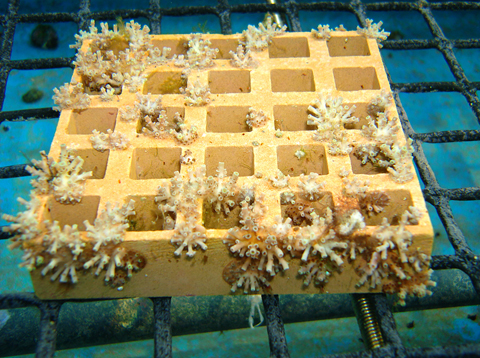Japan is mounting a US$7 million coral transplanting operation in the Pacific Ocean aimed at bolstering its side of a territorial dispute with China — and cementing Tokyo’s right to exploit a wide expanse of ocean.
Over the next year, scientists plan to plant more than 50,000 fast-growing Acropora coral fragments on Okinotorishima, two uninhabited rocky outcroppings about 1,700km southwest of Tokyo, project officials said.
The aim is to protect the islets — now circled by concrete seawalls — from further erosion and maintain Japan’s claim that they are bona fide islands that can be used to map its exclusive economic zone in the Pacific.

PHOTO: AP
In a sometimes heated dispute, China has challenged Japan’s claim, arguing that the outcroppings are too small to be defined as islands under international law, meaning the waters around them are open to use by other nations.
PRESERVATION
“We hope the corals will grow larger and eventually preserve the islets and their environment,” said Mayumi Tamura, of the Fisheries Agency. “We see corals as an important marine resource, not as a mere tool of territorial claims.”
The project began in 2006, when officials took 37 coral colonies from the outcroppings and brought them to the agency’s preserve on Aka island, near Okinawa, for breeding.
Since then, scientists have grown about 50,000 coral fragments, each about the size of a fingertip. Officials brought about a dozen of them to the islets last year as an experiment, and will bring another 40,000 on a three-week trip starting on April 22.
Tamura said the agency plans to take 10,000 already spawned fragments with tens of thousands more still to be bred in another trip planned for next January. The agency has a budget of ¥770 million (US$7.55 million) for the three-year project.
Koji Watanabe, a chief researcher at a government-funded Fisheries Infrastructure Development Center, said the small scale relocation and transplant of corals has been conducted in Japan, but that this would be the first involving so many fragments.
FISHING GROUNDS
“If we can achieve a mass relocation, that would be a major step forward for coral repairs in vast areas.” Watanabe said. “Coral plays a crucial role in the marine environment, and their loss could seriously damage fishing grounds.”
The fisheries agency has earmarked ¥227 million budget for the project for the fiscal year that began on April 1.
It isn’t the first time Japan has pressed its claim on the islets.
Japan has fortified the islets with cement embankments against the encroaching waves, and uses them to delineate its economic zone so it can lay exclusive claim to the natural resources 370km from its shores into the Pacific.
Japan has built a lighthouse just off the islets. Tokyo’s nationalist Governor Shintaro Ishihara, whose city has jurisdiction over the outcroppings, made a widely publicized visit there in 2005 to post a large metal address plaque on one of the rocks.
Ishihara has also announced plans to conduct bonito fishing and scientific research in the area.
The corals, which require no additional structures, are peaceful and environmental, Tamura said.
“So far, we haven’t heard any complaints [from China],” she said.

Archeologists in Peru on Thursday said they found the 5,000-year-old remains of a noblewoman at the sacred city of Caral, revealing the important role played by women in the oldest center of civilization in the Americas. “What has been discovered corresponds to a woman who apparently had elevated status, an elite woman,” archeologist David Palomino said. The mummy was found in Aspero, a sacred site within the city of Caral that was a garbage dump for more than 30 years until becoming an archeological site in the 1990s. Palomino said the carefully preserved remains, dating to 3,000BC, contained skin, part of the

‘WATER WARFARE’: A Pakistani official called India’s suspension of a 65-year-old treaty on the sharing of waters from the Indus River ‘a cowardly, illegal move’ Pakistan yesterday canceled visas for Indian nationals, closed its airspace for all Indian-owned or operated airlines, and suspended all trade with India, including to and from any third country. The retaliatory measures follow India’s decision to suspend visas for Pakistani nationals in the aftermath of a deadly attack by shooters in Kashmir that killed 26 people, mostly tourists. The rare attack on civilians shocked and outraged India and prompted calls for action against their country’s archenemy, Pakistan. New Delhi did not publicly produce evidence connecting the attack to its neighbor, but said it had “cross-border” links to Pakistan. Pakistan denied any connection to

TRUMP EFFECT: The win capped one of the most dramatic turnarounds in Canadian political history after the Conservatives had led the Liberals by more than 20 points Canadian Prime Minister Mark Carney yesterday pledged to win US President Donald Trump’s trade war after winning Canada’s election and leading his Liberal Party to another term in power. Following a campaign dominated by Trump’s tariffs and annexation threats, Carney promised to chart “a new path forward” in a world “fundamentally changed” by a US that is newly hostile to free trade. “We are over the shock of the American betrayal, but we should never forget the lessons,” said Carney, who led the central banks of Canada and the UK before entering politics earlier this year. “We will win this trade war and

Armed with 4,000 eggs and a truckload of sugar and cream, French pastry chefs on Wednesday completed a 121.8m-long strawberry cake that they have claimed is the world’s longest ever made. Youssef El Gatou brought together 20 chefs to make the 1.2 tonne masterpiece that took a week to complete and was set out on tables in an ice rink in the Paris suburb town of Argenteuil for residents to inspect. The effort overtook a 100.48m-long strawberry cake made in the Italian town of San Mauro Torinese in 2019. El Gatou’s cake also used 350kg of strawberries, 150kg of sugar and 415kg of